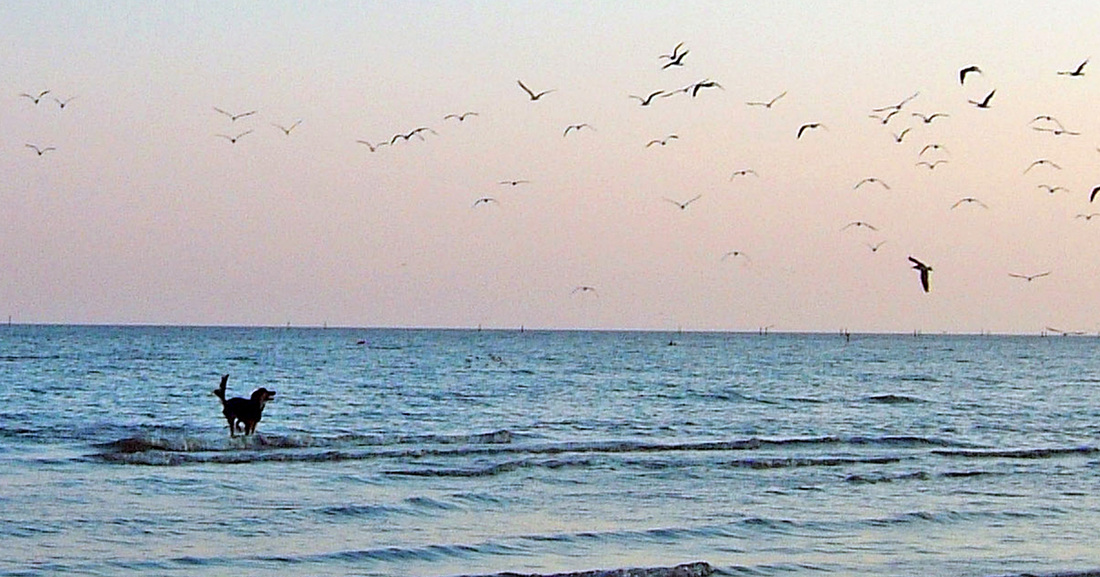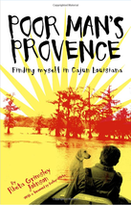 Rheta Grimsley Johnson is a 40-year veteran of southern journalism and author of several books (see below). She has worked as a columnist for newspapers in Memphis and Atlanta and today is syndicated by King Features of New York. She will be writing original monthly essays for The Cleaver from her home across the bridge in Pass Christian where she spends roughly half of each year. The rest of the time she lives in Iuka, Miss., in an old farmhouse in a cold, dark hollow. No Bottles, No Livestock, No Hank or Boo The sign says “No Dogs Allowed” in red letters, like Jesus’ words in the Bible. So whenever I cross the bridge from the Bay side and see that unequivocal sign, I always tell Hank to keep his fuzzy gray head down. Hank -- the found hound who wandered into my life at the folks’ house near Montgomery, so naturally he had to be named “Hank” – often rides in the passenger seat of my red Mini. Hank knows I’m being too literal about that sign, that it must mean no dogs allowed in the pedestrian lane. But he hunkers down anyhow. Can’t be too careful. Truth is, you do have to watch where you take a dog on this coast. In Harrison County, the law is no dogs on the beach. Here our dogs fall into the same category as wine bottles and motorized vehicles. Dangerous, destructive blights. East or West of us, in Jackson and Hancock counties, dogs on the beach on a leash are all right. Same dogs, just different counties. And yet rare is the day I don’t see dogs with their owners on the Pass Christian and Long Beach beaches. Are local Labradors and Yorkshire terriers mocking the law? Are some pet owners privileged, others not so much? I phoned Pass Christian City Hall. Not our purview, they said. The sheriff’s department is in charge of keeping marauding canines off the beach. Call them. So I did. And again, the buck was passed. Call the Sand Beach Authority, a dispatcher suggested. I phoned the Sand Beach Authority. Yes, Virginia, there is such a thing. The genial man I talked to at the SBA said the county sometimes gives warnings to dog owners, but in the 26 years he’s been with the authority he’s never heard of anyone actually paying a fine. So my heart gladdened, and I briefly believed the dog prohibition might be like one of those archaic laws against spitting on the sidewalk. I decided I might take Hank and his brother Boozoo for a beach walk. On a leash, of course. With a bag for clean-up, of course. The very next day a friend told me an acquaintance had been ticketed and must pay $85 for walking his dog on our beach. I guess that pooch really rubbed the law the wrong way. And, once the subject was broached, yet another story was told about a woman who had a policeman yell at her from his car when she was spotted with her puppy at the wave lap line. So I called the Harrison County Justice Court ticket office where a helpful woman had to look up the ordinance and get back to me. If caught and ticketed, you’ll pay no less than $25, no more than $500, depending on the judge’s mood. And you could do jail time, though no more than 30 days. Or at least that’s the letter of the law and enough for me to keep Hank and Boozoo off the sand. There’s no sight more joyous than a dog on the beach, legal or otherwise. Not all dog-owners are responsible and clean up after Rover makes a deposit, but I’d be willing to wager 99.99 percent do. At a swell North Carolina beach I visited last Labor Day, Ocean Isle Beach, there were more dogs than people. I never once saw untidy evidence. And on Hancock and Jackson counties, it appears humans are the ones who more often leave a mess. There’s a real demand for beaches where Fido can frolic with the rest of the family. When you check out Travelocity and other internet travel sites, would-be tourists often ask: “Are dogs allowed on the beach?” “We’ll stay in Texas,” one tourist responded when told of the Biloxi ban. “Let ‘em keep their empty beaches.” And though I feel badly for the stymied travelers, it’s a much worse situation for permanent residents who must figure out exactly where to walk their dogs. There are no sidewalks on my end of Second Street, so I try to keep my two dogs on the edge of neighbors’ yards to avoid the traffic. But many of the lawns are full of sand spurs. I swear dogs can smell them. My two had rather take their chances with a Hummer than a sand spur. Even using their leashes, it’s hard to keep them out of the road. Whenever a car is coming, I pull Hank and Boozoo, against their will, into the loaded grass. We struggle against one another to get to the deserted side streets where a dog can’t do much to hurt the vacant lots and forsaken foundations. Last summer when Hancock County Board of Supervisors accidentally – or so they said – banned animals on the beach, a great and righteous cry of indignation rose up from residents who enjoy walking their dogs near the ocean. I suspect some of them moved to Hancock County for that reason. That portion of the ordinance that prohibited leashed dogs and fireworks soon was retracted. Squeaky, dog-owning wheels got greased. Now I drive 8 or 10 miles to the Wolf River Nature Preserve to walk Boo and Hank who will follow me anywhere. I’ve always hated the idea of getting into a car to walk. But it beats sand spurs on their pads or 30 days in the joint. Books by Rheta Grimsley JohnsonYou can find Rheta Grimsley Johnson's books in bookstores nationwide and also at Bay Books (131 Main Street, BSL).
Comments are closed.
|
Categories
All
Archives
July 2024
|
Shoofly Magazine Partners
Our Shoofly Partners are local businesses and organizations who share our mission to enrich community life in Bay St. Louis, Waveland, Diamondhead and Pass Christian. These are limited in number to maximize visibility. Email us now to become a Shoofly Partner!
































 RSS Feed
RSS Feed























